Last Updated on May 20, 2024
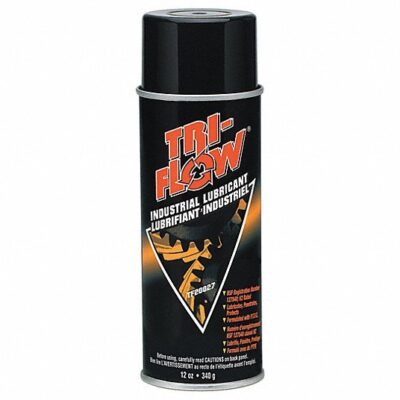
Which Lubricants are Best for Locks?
This is one of the most frequently asked questions locksmiths hear. And most people we talk to know about graphite as a lubricant. But it’s 2022, and there are several superior products for auto lock, home lock, and commercial lock applications.
The best lock lubricant, according to locksmiths, is a Teflon-based lubricant. Graphite tends to gunk up over time and oil-based lubricants will collect debris.
We’ll discuss some of the older and newer products to keep all your door locks operating smoothly.
Is Graphite a Good Lubricant for Locks?
Graphite is a common and stable form of the element carbon, and it has excellent properties as a dry lock lubricant. It can last a long time, and it does not attract dirt. It’s been used in locks for years and years, but it does have drawbacks.
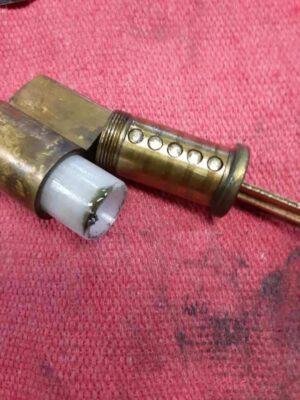
Graphite is a good choice for a lock body that is new or has been cleaned, but too many people put in too much graphite! Anytime they have problems, they just dump in more graphite! Eventually, the graphite itself (combined with any dust that may have accumulated in that time) starts to cause the problem and leads to the lock no longer turning easily. Since most people won’t know to take apart and clean their locks, it’s a big issue.
Also, graphite will adhere to and absorb nearly any liquid. If someone shoots a liquid lubricant into the lock, that has existing graphite in it, the graphite will work against it and gunk up the lock parts.
For these reasons, most locksmiths won’t recommend graphite for locks, although it’s still used by some tradesmen. It isn’t so much that graphite won’t work as a dry lubricant – it’s that graphite is misused as a dry lubricant, and there are better solutions available for non-professionals.
Is WD-40 a Good Lubricant for locks?
WD-40 has been commercially available for consumer use since the late 1950s, and it has found many uses around the home. It will, indeed lubricate a lock, and also inhibit corrosion (or help remove it), but the main drawback of WD-40 for lock lubrication is that it is a petroleum-based product that leaves an oily residue. The oily residues attract and hold onto dust, dirt, or other airborne contaminants, and these will cause the lock to operate poorly after a short time.
For servicing (cleaning) an old lock, WD-40 is useful as it can help remove corrosion so it can operate more smoothly, but all oil residues should be cleaned off after, using a de-greasing product, and then lubricated after with a non-oil based product. As a stand-alone lubricant, WD-40 is not the best choice for lock lubrication.
Locksmith recommended: The Best Lubricant for Locks are Teflon Based Lubricants
We at ACME Locksmith have our favorite, and we’ve reached out to a couple of locksmith distributors and fellow locksmiths to see if there is an industry consensus, and there is.
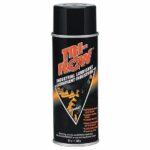
By far, locksmiths use a product that contains Teflon (yes, the same non-stick coating on cookware, in a different form). Teflon is a brand name (by Chemours), generically it’s known as PTFE or polytetrafluoroethylene. PTFE isn’t a new product (it was discovered by accident in the 1930’s), but it has found new applications and has been formulated into a spray lubricant product.
Teflon lubricants are the best lock lubricants because: they’re “hydrophobic”, which means liquids don’t like to stick to them (hence its use in cooking, but it also helps prevent rusting and corrosion), they’re chemically inert at any temperatures a human is likely to encounter, and they have one of the lowest “coefficients” of any solid (a fancy way of saying it’s slippery). Since almost nothing will stick to it, it won’t attract dust or dirt. On application, it can help loosen light corrosion. It won’t stain (although some of the corrosion and gunk it removes on application might).
These are often referred to as silicon-based lubricants.
Here at ACME, our favorite lock lubricant featuring PTFE is Tri-Flow (it’s priced very affordably on our website). We prefer the spray as you can get it inside the lock cylinder easily and that’s what we sell. But Amazon also has a number of different types available (drip & dry). Locksmiths almost exclusively prefer and use the spray.
There are similar products also manufactured by other brands, such as Lock-Saver or DryFilm.
Houdini is another lock lubricant that is very popular with our Phoenix locksmiths. It too is available on Amazon.
Just look and see that it’s using either PTFE or the brand Teflon as it’s base.
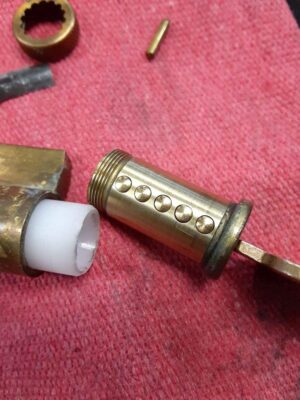
Disclosure: As an Amazon Associate I earn from qualifying purchases.
![]()
More of Our Favorite Security Products
See our Amazon Store for Videos and Links to All of Our Favorite Security Products.
Door Armor: Reinforce your doors. This video on YouTube shows the installation of Door Armor, and you can buy this or similar products from Amazon at a great price.
Video Doorbells: This video doorbell offers great images and video and has NO monthly video storage fees. Watch our SkyBell Video Doorbell Review on YouTube and buy it on Amazon.
Smart Locks: Access Your Locks via Smart Phone. You’ll find some of our favorite smart locks that allow you to control home access and monitor entry in our Amazon Smart Lock Shop. Watch our Smart Lock Comparison Video on YouTube for reviews of the most popular Smart Locks.
High-Security Safes: When you want a safe that is designed to protect the valuables you put inside, you want a high-security safe found on ACME Locksmith’s Safes for Sale website.
Sliding Glass Door Lock: The best Arcadia door lock that stops your sliding glass door from being lifted out of its tracks and prevents little ones from opening the door and leaving the home. Check out the video on YouTube and Buy it on our website.
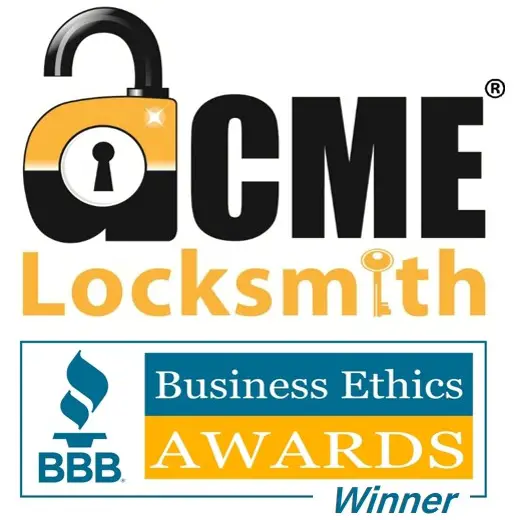
Leave a Reply